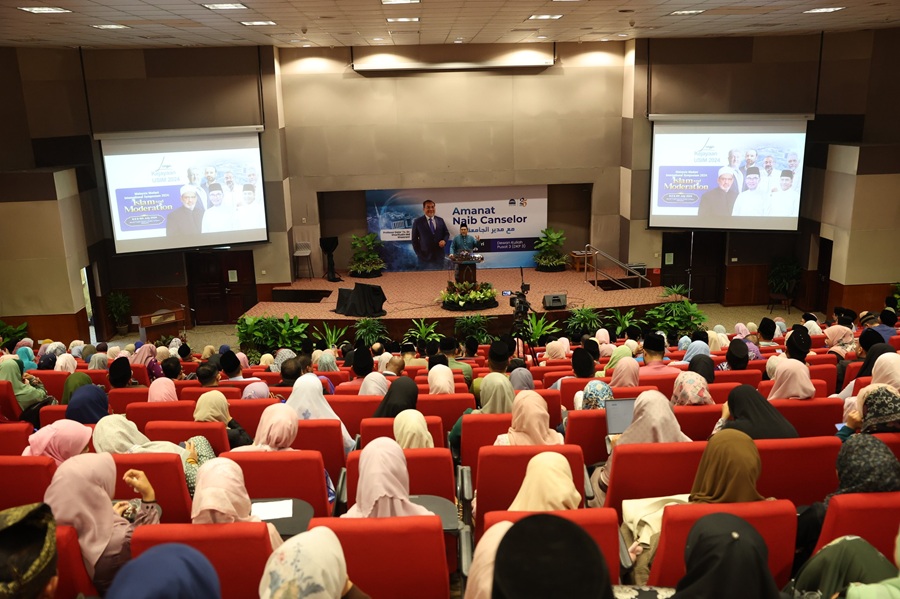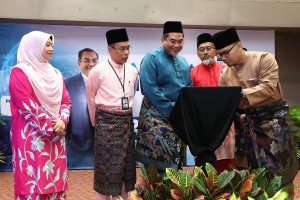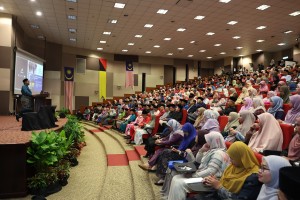NILAI – The Vice-Chancellor of Universiti Sains Islam Malaysia (USIM), Professor Dato’ Ts. Dr. Sharifudin Md Shaarani, delivered a forward-looking 2025 Mandate Address during an official ceremony held at Lecture Hall 3, USIM recently.
The event was attended by approximately 500 staff members from various departments and faculties, with wider engagement achieved through live streaming across multiple platforms.
Carrying the theme “Crafting Success, Making Changes,” the mandate outlined USIM’s renewed commitment to institutional transformation and societal impact through innovation, collaboration, and values-driven leadership.
Professor Sharifudin emphasized the importance of collective effort as USIM enters a new strategic phase in 2025.
“There were many ups and downs in our 2024 journey, and we have learned a lot. We must face the challenges of 2025 together, as one big family,” he said.
Addressing contemporary challenges in higher education, the Vice-Chancellor also cautioned about the unrestrained use of artificial intelligence in academic assignments.
“We must discipline ourselves and our students in utilizing technology—not to reject it, but to use it with absolute responsibility,” he stressed.
In alignment with the Minister of Higher Education’s Mandate 2025, which sets out seven key national focus areas, Prof. Sharifudin announced six core objectives that will guide USIM’s policies and programmes for the year. These objectives aim to enhance talent development, research, student well-being, digital infrastructure, leadership culture, and financial sustainability.
The first objective, Strengthening the Talents and Culture of Appreciating Knowledge, focuses on integrating digital learning elements, ensuring course alignment with KPT and INAQ USIM standards, and introducing structured pedagogical and andragogical training to enhance teaching and learning experiences.
The second objective, Stabilizing the Research and Innovation Ecosystem, aims to reinforce the role of research and innovation by stabilising RDICE units, promoting academia-industry collaborations, developing start-up initiatives, and expanding training programmes such as the Barista Halal Certificate. “If we proceed, USIM could be the first university to partner with industry for a Barista Halal Module,” Prof. Sharifudin noted.
The third objective, Inspiring the Fi-Qalbi Campus Well-Being Programme, places emphasis on student welfare and holistic development. It includes programmes to promote mental health awareness, social entrepreneurship, and alumni engagement. The Vice-Chancellor stressed the importance of equipping Islamic studies students with entrepreneurial skills and called on the Student Affairs Division and the University Health Centre to remain vigilant about students’ mental well-being. “Although cases are mild, I am still very concerned,” he said.
The fourth objective, USIM Students and Staff: Leaders, Competent and with Integrity, focuses on nurturing future leaders through the development of INAQ-based leadership models and initiatives such as the Academic Early Career Development Programme, LEAD, and LEAP. The implementation of the Japanese-inspired Ho-Ren-So communication concept was also highlighted as a practical tool to enhance organisational communication and culture.
The fifth objective, Enriching the Ecosystem of Digitalisation and Infrastructure, outlines plans to improve the university’s digital readiness through immersive learning spaces, cyber security enhancements, upgraded Wi-Fi systems, and a vehicle plate recognition system for attendance.
The sixth and final objective, Financial Sustainability, focuses on diversifying income sources through partnerships with local and international organisations. Proposed initiatives include transforming the USIM campus into an educational tourism site with glamping and adventure park attractions, expanding endowment strategies, and upgrading the USIM Food Square into a vibrant Souq Tijari. “When the Food Square is completed, I hope staff and students will support it and dine there,” Prof. Sharifudin said.
The event concluded with the official launching of the Iqra’ Centre for Ummah, a centre that positions USIM as a national leader in delivering Quranic services to the community, in line with the university’s Islamic mission and values.
The 2025 Mandate Ceremony signaled a new chapter for USIM, underlining the university’s dedication to embracing change and crafting impactful success for the benefit of its students, staff, and the wider ummah.
Translated by: Muhammad Nasrullah Syahmi Badrul Sham



